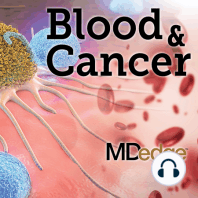21 min listen
Understanding biosimilars
FromBlood & Cancer
ratings:
Length:
20 minutes
Released:
Feb 6, 2020
Format:
Podcast episode
Description
Think of biosimilars as your mother’s minestrone soup: It’s the same recipe and ingredients every time, but not every batch is chemically identical, even if it tastes about the same. That’s how Brian T. Hill, MD, PhD, of the Cleveland Clinic, describes biosimilars. He joins Blood & Cancer host David H. Henry, MD, of Pennsylvania Hospital, Philadelphia, to discuss how biosimilars are made and approved, and how they differ from generic drugs. In Clinical Correlation, Ilana Yurkiewicz, MD, of Stanford (Calif.) University, talks about percentages -- what they mean, what they don’t mean, and how they can be interpreted in oncology. * * * What are biosimilars? Monoclonal antibodies and biologics are complex and large proteins that are made in cells and bioreactors. Because they are made in “nature” instead of a synthetic reaction (discussed with generics), slight differences can be expected in the molecular structure. Those slight variances do not create clinically meaningful differences between the biosimilar and the original product. Biosimilars go through very stringent review by the Food and Drug Administration and head-to-head clinical trials with the originator drug. Biosimilar vs. generic drug This is in contrast to a “generic” drug. In generic drugs, the chemical composition of all brands is synthesized identically. An insurance company may approve a biosimilar, but not the originator drug. Monoclonal biosimilars are on the way as the patent expires; this could soon mean that Herceptin (trastuzumab) will have a biosimilar. Points: Insurance driven or otherwise, both Dr. Hill and Dr. Henry would be comfortable using biosimilars. Show notes by Ronak Mistry, DO, resident in the department of internal medicine, University of Pennsylvania, Philadelphia. * * * For more MDedge Podcasts, go to mdedge.com/podcasts Email the show: podcasts@mdedge.com Interact with us on Twitter: @MDedgehemonc David Henry on Twitter: @davidhenrymd Ilana Yurkiewicz on Twitter: @ilanayurkiewicz
Released:
Feb 6, 2020
Format:
Podcast episode
Titles in the series (100)
2019 drug approvals in hematology-oncology: , of the University of Pennsylvania, Philadelphia, joins the podcast to discuss noteworthy drug approvals in hematology-oncology in 2019. Dr. Mintzer and Blood & Cancer host, , of Pennsylvania Hospital, Philadelphia, discuss what these new... by Blood & Cancer
